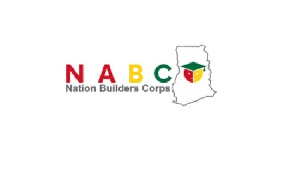It is true that every government will always have an intention of tackling unemployment issues in every economy. In fact, it is always the sugary part of all political promises. National builder corps is a social intervention policy initiative by the NPP government to address the unemployment situation in Ghana.
NABCO is aimed at addressing graduate unemployment by offering temporary employment and also to improve the skills of graduates to make them ready when permanent opportunities arise.
Before I start to digest pertinent issues surrounding the NABCO enterprise, let me unwear my political spectacles. It obviously agreed that no graduate will like to complete a three or four-year tedious academic work in school just to join unemployed graduates associations.
Both past and present governments have tried diverse means to dealing with unemployment issues in Ghana, but they seem not to be hitting on the head of the reality. As we all agree that government cannot deal with unemployment alone without the involvement of the private sector. In fact, the private sector is the largest employment ‘industry’ in Ghana. The public sector is just for the selected few.
I still cannot understand some portions of the vision of NABCO- “to improve the skills of graduates to make them ready when a permanent opportunity arises”
Well, I have the following questions to ask:
1. Does it mean that Ghanaian graduates do not have the requisite skills readily for the job market?
2. If so, is our educational curriculum doing Ghanaian graduates good?
3. How much taxpayers money be used in improving the skills of graduates under the Nabco?
4. When will the permanent jobs arise?
5. Is it compulsory for government to absorb graduates into the public sector?
I think this NABCO is here to just dissolve unemployed graduate associations, zip the mouth of graduates, and to overstaff certain institutions.
Taking a holistic look at the employment structure of Ghana, one would realize that the public sector is saturated or full to the brim already, as it has been announced by both past and present administrations.
The private sector, which is the largest shareholder in the employment industry is also faced with certain constraints. Therefore, its inability to employ more graduates.
I see NABCO as a duplication of an already existing employment initiative, which is basically to dissolve unemployed graduates associations, zip the months of graduates because they are making ‘noise’ for jobs, waste of taxpayers money, and ultimately waste of graduates time.
The most popular month in Ghana is September. The month of employment-whereby every potential job seeker justifies his or her inclusion. It comes with the following reactions within the job market;
Institutions and organizations are recruiting new workers
Institutions are accepting intern or attachment students
Institutions are accepting national service personnel
And probability, accepting Nabco personnel
This may be a clear indication of overstaffing right?
MUST GOVERNMENT ALWAYS PROVIDE JOBS?
No! In fact, about 80% of Ghanaian graduates leaving school every year can be better entrepreneurs and are willing to start their own businesses. They only need a little capital to set the ball rolling.
Now let us do this analysis under the Almighty NABCO.
Government said 100,000 graduates to be employed this year. Each employee will be paid ghc700. Which means that within a year with all this been equal, an employee might have accumulated a gross sum of ghc8,400. If the supposed 100,000 graduates are employed, then government has to allocate a total of ghc70,000,000 (70million) in order to pay them. And if an employee will receive ghc8,400 in a year, then a total of ghc 840,000,000 (840million) will be spent by government in a year.
We are all aware of programs and initiatives under the youth employment agency (YEA) and other entrepreneurship and startup programs where qualified graduates are given initial capitals to set up their own businesses. Same can be done under NABCO.
In dealing with unemployment crisis in Ghana, policymakers must initiate policies and programs that will give permanent solutions rather than curbing it temporarily. Otherwise, it will be a recurring event.
NABCO, for example, can be modified to deal permanently with the issues of unemployment. Instead of giving ghc700 to employees who may not be able to save ghc10 at the end of the month, considering the economic situations in the country, government may consider the following;
1.Government can set up what I call “GHANAIAN GRADUATES FUND” in which a seed money is deposited, and with an annual top-up from government revenue to purposely tackle unemployment issues in Ghana.
2. Government should request a simple but tangible or convincing business proposal from graduates.
3. Government should select the number of graduates that can be supported by the fund (example 100,000 graduates)
4. Give them an initial capital of say ghc8,000 to start their own businesses
5. Assign a ministry to monitor their business progress and assist them the technical advice for a year
6. Task these 100,000 graduates to also at least employ one person under their business.
7.Those making good progress should be given additional funding to enable them expand.
For all you know, some the graduates just need a startup capital of ghc1,000, and they will never ask government any job.
We have the resources and we CAN do it as a nation. It is a matter of priority and good leadership.
#MayAllahBlessAllUnemployedGraduates
Opinions of Wednesday, 29 August 2018
Columnist: Hadi Amadu















